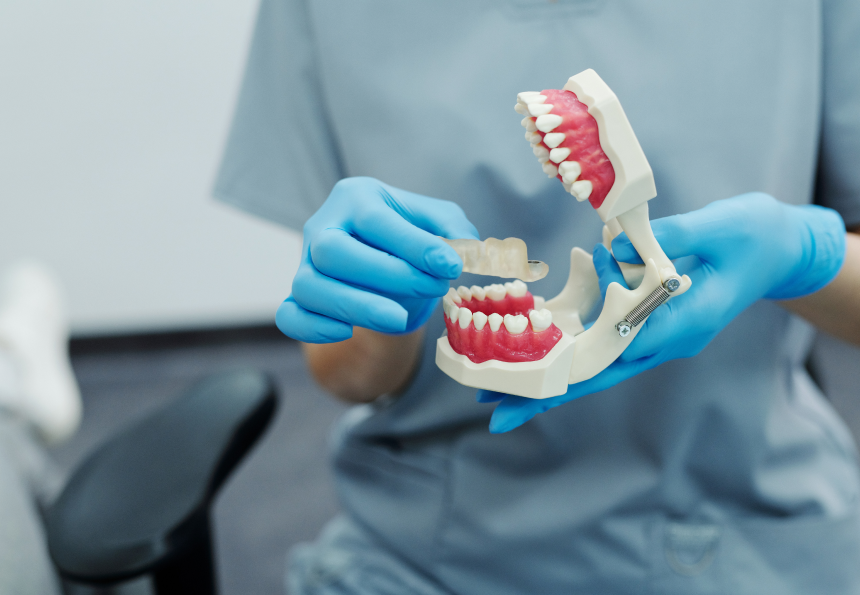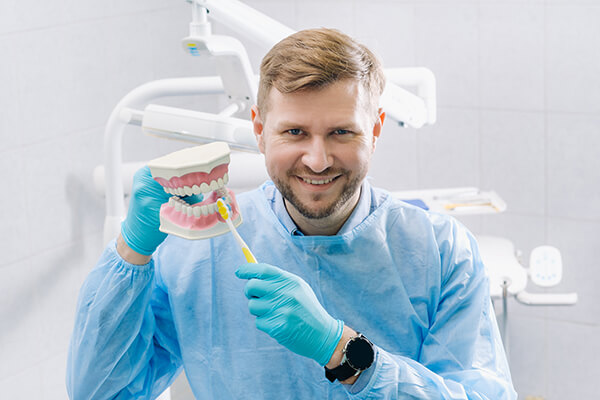Experience Comprehensive Dental Care with a Trusted Eugene Dentist
Experience Comprehensive Dental Care with a Trusted Eugene Dentist
Blog Article
A Guide to Common Oral Conditions That Need a Dental professional's Care
Comprehending the range of oral conditions that necessitate specialist care is paramount for maintaining optimal dental health. Toothaches, for instance, can be symptomatic of severe concerns such as dental caries, broken teeth, or abscesses, each needing certain treatments like dental fillings or origin canals. Periodontal disease, from the beginning of gingivitis to a lot more severe periodontitis, emphasizes the importance of normal oral examinations and cleansings. Affected wisdom teeth and jaw disorders can present substantial pain and issues. Ensuring timely brows through to the dental practitioner can alleviate these problems effectively, but just what are the therapies and signs involved?
Toothaches
Toothaches are an usual oral condition that can range from light pain to serious discomfort, often showing a hidden concern that requires specialist interest. This pain can come from a selection of resources, including oral cavities, split or fractured teeth, and dental abscesses. Each of these problems postures significant dangers if left unattended, potentially causing more severe difficulties.
Oral tooth cavities, additionally understood as decays, are caused by the buildup of plaque that erodes tooth enamel, leading to openings or pits in the impacted teeth. Abscesses are excruciating infections at the root of a tooth or in between a tooth and the gum, normally resulting from extreme degeneration or untreated dental caries.
Effective therapy of toothaches includes dealing with the root cause. This might include dental fillings for tooth cavities, crowns for split teeth, or origin canals and antibiotics for abscesses. Very early treatment by a dental specialist can prevent further deterioration and alleviate discomfort, making certain optimum dental health and wellness.
Gum Condition
Periodontal illness, a prevalent yet usually forgotten oral condition, materializes via swelling and infection of the gums and sustaining tissues. If left without treatment, gingivitis can progress to periodontitis, an extra severe kind identified by the devastation of the supporting bone and connective cells, eventually leading to tooth loss.
The main reason of periodontal condition is microbial plaque, a sticky, anemic film that frequently develops on teeth. Poor oral health, smoking, genetic tendency, and specific medical conditions, such as diabetes, can exacerbate the risk of establishing periodontal condition. Regular dental examinations are vital for early detection and management of this problem.
Therapy for gum tissue illness ranges from expert dental cleaning and scaling to advanced treatments like root planing and periodontal surgical procedure, depending on the seriousness. Preserving great oral hygiene techniques, including cleaning two times daily, flossing, and using an antibacterial mouth wash, can dramatically minimize the danger of periodontal condition and advertise much healthier periodontals.
Tooth Cavities
Tooth cavities, likewise called cavities, are a common oral condition defined by the destruction of tooth enamel because of acid-producing microorganisms in the mouth. These germs grow on sugars and starches from food and beverages, producing acids that slowly wear down the enamel, causing dental caries development.
Early-stage cavities may disappoint signs and symptoms, but as they proceed, they can trigger tooth pain, level of sensitivity to warm or chilly, visible openings or pits in the teeth, and discoloration. If left unattended, tooth cavities can pass through deeper layers of the tooth, potentially resulting in severe pain, infection, and even tooth loss.
Avoiding tooth cavities involves a combination of good dental hygiene methods and dietary routines. Normal cleaning with fluoride tooth paste, flossing, and routine dental examinations are crucial. Dentists may likewise advise additional safety nets, such as fluoride therapies and dental sealers, to shield teeth from decay.
Minor tooth cavities can be resolved with dental fillings, which recover the tooth's structure. Much more innovative instances may need crowns or also root canal therapy if the degeneration has reached the tooth's pulp.

Impacted Wisdom Teeth
Affected knowledge teeth are a widespread oral problem that takes place when the 3rd molars, generally referred to as knowledge teeth, fail to completely arise or line up appropriately within the mouth. This problem usually results from not enough area in the jaw or an irregular development angle of the teeth. Impacted wisdom teeth can result in a variety of difficulties, including discomfort, infection, and damage to nearby teeth.
When knowledge teeth end up being affected, they are usually partially erupted or stay totally under the gum line. This partial eruption can create a pathway for microorganisms to go into the gum tissues, bring about infections that materialize as swelling, discomfort, and even fever. Furthermore, affected knowledge teeth can apply pressure on bordering teeth, potentially creating crowding or moving.
A thorough dental exam, normally entailing X-rays, is vital for diagnosing influenced knowledge teeth. Therapy often entails medical extraction, carried out by a dental cosmetic surgeon. The treatment intends to ease discomfort and stop further problems, such as cysts or damage to surrounding bone frameworks. Post-operative treatment is important to make sure correct recovery and decrease the danger of infection. Normal dental check-ups are suggested to keep track of the problem and maintain oral health and wellness.
Jaw Conditions
Jaw problems, jointly referred to as temporomandibular joint (TMJ) check disorders, incorporate a variety of problems that influence the jaw joint and surrounding muscle mass. These conditions can materialize via signs and symptoms such as discomfort or inflammation in the jaw, difficulty eating, a clicking or standing out audio when shutting the mouth or opening, and even chronic frustrations. TMJ disorders can develop from numerous elements, consisting of joint inflammation, jaw injury, or regular habits like teeth grinding or jaw clenching.
Diagnosis of TMJ disorders typically involves a comprehensive examination by a dental professional, including a physical examination of the jaw, oral X-rays, and occasionally advanced imaging techniques like MRI or CT scans to analyze the joint's condition. Non-invasive approaches such as physical therapy, dental splints, and drugs aimed at lowering inflammation and discomfort are typically first-line therapies.
Very early treatment by an oral expert is vital to stop the development of TMJ conditions Resources and to keep total dental wellness. Clients experiencing relentless jaw discomfort or dysfunction need to look for punctual examination and therapy.
Conclusion
Toothaches frequently show underlying problems such as cavities, cracked teeth, or abscesses, needing punctual intervention. Impacted wisdom teeth and jaw disorders also call for expert focus to alleviate discomfort and avoid further complications.
Oral tooth cavities, additionally recognized as cavities, are caused by the accumulation of plaque that erodes tooth enamel, leading to openings or pits in the influenced teeth. Abscesses are painful infections at the origin of a tooth or in between the gum tissue and a tooth, normally resulting from severe degeneration or neglected tooth cavities.

Furthermore, impacted wisdom teeth can put in pressure on surrounding teeth, possibly creating Full Article crowding or shifting.
Report this page